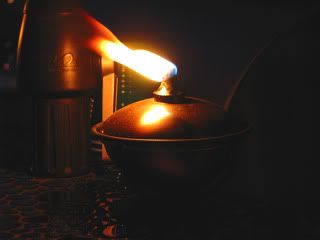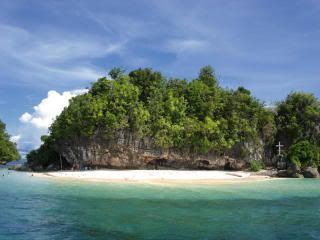
As far as spelling goes, the old Bretania is dead. But from its ashes, the new Britania rises!
A morning after Easter, the gang was sharing food and laughs at Japan’s when someone said: “Why don’t we go to Britania?” And just like that, we did!
Japan borrowed a van whose fan belt was so loose it screamed. The only way you could hush it, the mechanic said, was by shutting off the air-conditioning system. And just like that, we did!
Part of the fun was enduring the oven hot interior because the windows wouldn’t open and we didn’t know until we were on our way home that there was a lift-off vent on the roof.
We picked up Tata and Nelson in Sumo-sumo. Felna wanted at first to come but decided she had had enough sunburn on her back and was better off playing with her neighbors who adored her Michigan twang.
We had lunch at the Sto. Nino diner. But all the seafood we were craving for were gone as it was already past one o’clock. And so Nelson just feasted on beef steak and balbacua.
We turned left at Salvacion junction. The tarp carrying some shots of the islands, the mayor, and a poorly conceived tagline dwarfed the waiting shed that now had gone sunken after the elevation had changed due to the concreting of the highway. As we entered Salvacion, I noticed nothing much had changed: the road remained narrow and unpaved; no signage to guide visitors and tourists.
After so much asking for direction, we exited Salvacion and turned right, toward Britania. The landscape turned rustic and the one-lane road was grassy and rugged. By the roadside, sun-browned kids trailed in single file, carrying either vegetable or jackfruit on their heads and fish on their hands; water buffalos sunbathed in mud wallows under slender trees while a few birds twitted rhythm and blues; the fresh smell of weeds threw me back to my childhood and I felt nostalgic.
Then we reached a forked road at the center of which were a tree and a mud puddle. Japan, who visited Britania a few days earlier, couldn’t say which one to take. The driver chose left and stopped to ask the woman balancing a basin of laundry on her head. She said we took the wrong turn.
Back at the forked road, we took a detour to the right. A few meters later, we could already see the turquoise water, the majestic islands and the white sand gleaming from the mid afternoon sun.
“Going to the island?” a man barked from the window, keeping pace with the van. We pulled over and got off to the fresh, cool air of Britania. The coco fronds swayed as though welcoming us.
The fishing village hadn’t changed. A few nipa huts there, a sari-sari store here. Outrigger boats dotted the shore; thin and dark children played around while their pregnant mothers sat on the rungs of a bamboo stair and raided each other’s head of lice; grimy, half-naked men drank tuba from the same glass.
Few meters from where we stood was an unfinished sea wall that served as jump-off point to Britania Islands. From afar I saw something new that wasn't there when I last visited Britania 10 years ago. There was a boardwalk that extended from the shore to the water by at least 100 meters. Some people were pacing its entire length while others were taking pictures. Inside the big shed by the boardwalk’s midsection, people were waiting for their boat to arrive. And near the shore, carpenters were busy building a similar shed.
Japan haggled with boatmen and settled for P800 which included whisking us off to the islands and back and watching our things. It was a bit expensive because it was quite late in the afternoon and almost all boats had already been commissioned for the day. (We were told that other times one could strike a deal for as low as P500.)
(A little disclosure: For those not used to taking an outrigger boat and don’t know how to swim, the trip to the islands could be scary especially that no life jacket is available.)
Nelson looked nonchalant but I knew he was as jittery as Elaine whose knuckles turned white from gripping the boat’s ridge. I told them not to worry because the boat had an outrigger, but should it capsize, to make sure to hold on to it and not let go. Besides, I said, boatmen are here to save us all. But still, when the motorboat roared to life, I thought I heard the fast beating of their hearts.
The boat made a path on the clearest water I had ever seen, so clear that we could see things underneath like we were looking through a giant aquarium. Fifteen minutes or so later, the boat hit fine sand. And that’s when we knew we had reached the magical island this side of Surigao del Sur.
Britania, in my book, is a paradise. And the thing with paradise is that there’s no way you can describe it. You only have to experience it.
Visit Britania. Experience paradise!
*************
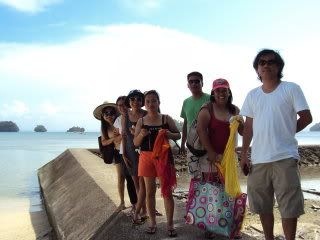
at the sea wall. note the islands at the back.
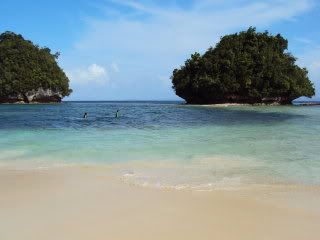
during low tide, you can island-hop on foot like we did in this picture!
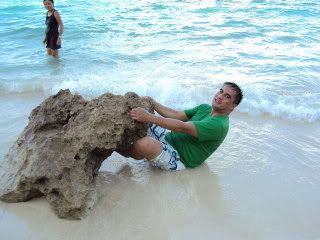
uprooting a rock to know what treasure lies beneath the fine sand.

too old to become mermaids?
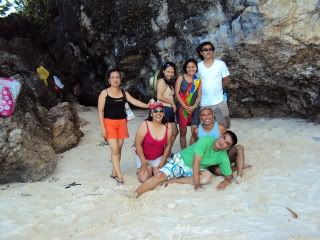
how fine is the sand? think Goldilocks polvoron!
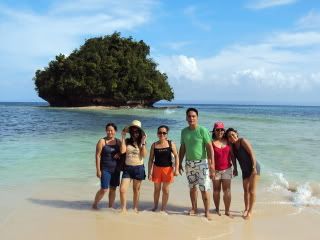

britania in full splendor!

